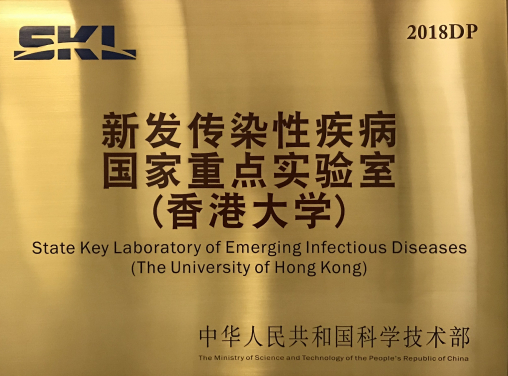Media
HKU and CEPI extend collaboration on development of COVID-19 nasal spray
19 Mar 2021
In response to the ongoing pandemic of COVID-19, the University of Hong Kong (HKU) has extended its collaboration with the Coalition for Epidemic Preparedness Innovations (CEPI) to evaluate a nasal spray COVID-19 vaccine made with live attenuated influenza viral vector. The effort is led by the State Key Laboratory for Emerging Infectious Diseases (SKL) at HKU.
CEPI earlier invested an initial sum of US$0.62m in a partnering agreement with the University of Hong Kong (HKU) to rapidly develop a vaccine candidate against COVID-19. The current agreement provides initial funding to HKU to undertake preclinical testing of the nasal vaccine candidate.
On March 18, CEPI announced an expanded partnership with HKU, under which CEPI will invest an additional US$4.89m to fund the production of clinical trial materials and the investigation of mucosal immune responses during a Phase 1 trial of the vaccine candidate, which is being supported by the Government of Hong Kong.
Launched at Davos in 2017, CEPI is a partnership between public, private, philanthropic, and civil organizations in a joint effort to develop vaccines to stop future epidemics. Established in 2005, SKL has played a key role in supporting Hong Kong’s response to outbreaks of infectious diseases in recent decades, including avian influenza and the current COVID-19. Professor Yuen Kwok-yung of the Department of Microbiology serves as a co-director of the lab.
Massive vaccination campaigns have started in many countries while SARS-CoV-2 continues to evolve and mutate through circulation in humans. There is urgent need to address variants of concern and to optimize current vaccines. The extended CEPI-HKU collaboration is the second of CEPI’s next-generation vaccine investments, which are designed to develop vaccines that are easier to deliver, and address the needs of a diverse range of populations and settings. The HKU team is led by Professor Honglin Chen, along with team members Professor Zhiwei Chen, Professor Ivan Hung, Professor Yiwu He and Professor Yuen Kwok-yung.
The President and Vice-Chancellor of HKU Professor Xiang Zhang said: “I am thankful for the continued support from CEPI on our vaccine research. The University of Hong Kong has outstanding researchers in emerging infectious diseases and has made significant contributions in the response to the emergence of COVID-19. I am hopeful that the unique nasal spray COVID-19 vaccine being developed will contribute to the ultimate control of the disease.”
Dr. Richard Hatchett, CEO of CEPI, said: “It is remarkable that in such a short space of time the world already has multiple safe and effective vaccines which are being rolled out to protect people against COVID-19. But we must also plan for the longer-term management of this virus by continuing to invest in vaccine R&D. I am pleased to expand our partnership with the University of Hong Kong which will further explore the potential of this promising vaccine candidate – the only intranasal COVID-19 vaccine in CEPI’s portfolio.”
Since March 2020, researchers at HKU have collaborated with vaccine manufacturers including Wantai Biopharm, BCHT and Hualan-Bio in Mainland China to develop a vaccine candidate based on the established flu-based DelNS1 live attenuated influenza virus (LAIV) platform. A phase I/II clinical trial has been conducted by Wantai Biopharm in Mainland China and a Phase I trial is also scheduled in Hong Kong in April 2021. There are several unique features of the HKU nasal spray COVID-19 vaccine:
- It can be used easily via nasal spray.
- It can be combined with any seasonal flu vaccine strains in future to prevent both flu and COVID-19.
- It has a safe feature with the removal of the key virulent element and immune antagonist, NS1, from the viral genome and potentially be more immunogenic than wild type influenza virus.
- It can be easily produced from chicken embryonated eggs and MDCK cells which are proven production systems for influenza vaccines.
- It can be quickly modified to respond to the emerging variants.
- It does not require storage at extremely low temperature.
About the State Key Laboratory for Emerging Infectious Diseases
Department of Microbiology, The University of Hong Kong, Hong Kong SAR, China
The State Key Laboratory of Emerging Infectious Diseases at HKU was established by the Ministry of Science and Technology (MOST) in recognition of the outstanding contribution made by HKU scientists in response to the SARS outbreak during 2003/2004, both in mainland China and in Hong Kong. Establishment of this State Key Lab was approved by the MOST in July 2005. Its mainland partner is the SKL for Infectious Diseases Prevention and Control (Chinese Center for Disease Control and Prevention).
The four major research directions of the State Key Laboratory of Emerging Infectious Diseases are:
- Ecology and evolution of avian influenza viruses
- Pathogenesis of influenza and SARS viruses
- Emerging viral pathogens
- New vaccine technology
Please click here for CEPI’s press release.
For media enquiries, please contact Ms Melanie Wan, Senior Manager (Media) of the HKU Communications and Public Affairs Office at tel: 2859 2600 or email: melwkwan@hku.hk.

